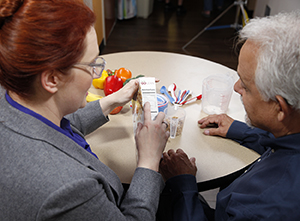Good Nutrition for Chronic Lung Disease
Good nutrition helps keep you healthy. Your weight and the foods you eat relate directly to how much energy you have. But shortness of breath during meals can keep you from getting the nutrition your body needs. A dietitian or other healthcare provider can work with you. They can help you set up a healthy meal plan that includes foods you like.

What you should eat
Try to maintain a balanced diet that includes a variety of these foods:
-
Protein. This includes meat, beans, and soy products. Protein helps build muscle mass.
-
Dairy products. These include milk, cheese, and yogurt. Dairy products help keep bones and teeth strong. Dairy is also high in protein.
-
Fruits and vegetables. These give you the vitamins you need to stay healthy.
-
Breads and starches (carbs). These help you sustain energy. Carbs that are also high in fiber, such as whole-grain breads, may have longer-lasting effects than other carbs.
-
Fluids. These keep you hydrated. Drinking fluids may also thin mucus. It’s good to drink 6 to 8 glasses of water a day (unless told otherwise by your healthcare provider).
If you’re having trouble eating
The stomach sits right under the diaphragm. This is a muscle that helps you breathe. A full stomach makes it harder for the diaphragm to move down. This can make breathing harder, causing shortness of breath during and after meals. These tips can help:
-
Eat smaller meals during the day. This way your stomach doesn’t get as full. And your lungs have more room to expand.
-
Chew slowly with your mouth closed. This helps stop you from swallowing air.
-
Try to stay away from or limit foods that cause gas. Gas makes the stomach swell and press on the diaphragm. These foods can include onions and cabbage. Not all foods have the same effects on all people. Keep track of the ones that cause problems for you.
Vitamins and supplements
If you’re not getting enough vitamins and other nutrients, you may be told to take them in pill form. Supplement drinks can also help you get the nutrients you need without getting too full. Talk with your healthcare provider before trying any over-the-counter vitamins or supplements.
If you have acid reflux
A lot of people with chronic lung disease have problems with acid reflux. This can cause symptoms such as coughing, heartburn, and upset stomach. Here are some things you can do:
-
Limit foods that increase acid in the stomach. These include spicy foods, caffeinated drinks, and alcohol.
-
Don't lie flat for 2 hours after eating. At night, prop yourself up on pillows.
-
Talk with your healthcare provider or a dietitian about creating a special diet so you don't have acid reflux. Also ask your healthcare provider about medicines that may help.
© 2000-2024 The StayWell Company, LLC. All rights reserved. This information is not intended as a substitute for professional medical care. Always follow your healthcare professional's instructions.